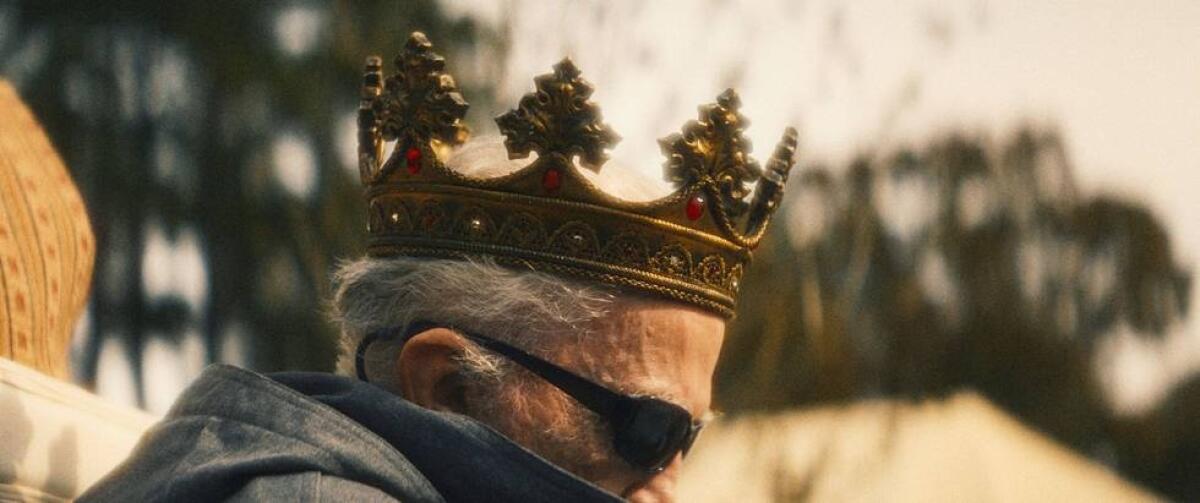In HBO’s rewarding new docuseries, a power struggle at a Texas Renaissance faire

- Share via
I haven’t been to a Renaissance faire since — well, not quite since the Renaissance, but a really long time. I know from the billboards, though, that a local edition is still going strong. The one I knew — the original Renaissance Pleasure Faire — was held on the Paramount Ranch in Agoura Hills, among the oaks, a cozy, nonprofit, semi-educational, handcrafted hippie festival co-sponsored by KPFK, our leftist community-sponsored radio station. This was back when LARPing had no life past Civil War reenactors, before cosplay went mainstream, before “Dungeons & Dragons,” Medieval Times restaurants and thatched-roof fantasy blockbuster movies.
All things change, even in the re-created Renaissance, and such events, which have proliferated across the country and into Europe, can be big business. In the documentary series “Ren Faire,” premiering Sunday on HBO, Lance Oppenheim (“Some Kind of Heaven”) trains his camera on the 50-year-old Texas Renaissance Festival, outside of Houston, which claims to be the biggest in the nation, and specifically its founder, owner and operator, George Coulam.
The constructed narrative is one of a power struggle. (This is not a detailed look into the obviously complex workings of a Renaissance faire.) In his mid-80s, George is thinking of moving on — he has determined somehow that he will live to be 95, exactly, and wants to leave enough time for working on his art, his gardens and to “chase ladies.” To this end, he’s on 15 dating apps, including “sugar daddy” sites; we accompany him on a couple of dates to the Olive Garden, where his first and potentially only question is “Are your breasts natural?”
“What is the king without his kingdom?” muses George, who favors shirts with patches representing stars and military medals. “What is the king without his property? He’s free.” But, as we will see, giving up his fiefdom won’t be so easy.
“It’s just a game — some people lose and some people win and some people win more than others,” observes Glenda, a.k.a. Fairy Godmother, who has known him for a long while. “Something to fill that emptiness, his games.”
Not only is he “King George” in the context of the faire and the minds of many around him, he’s also the mayor of Todd Mission, the town he incorporated in order to be able to stage an event as large as the festival. (It has its own police force.) He lives there in a stone-walled house he calls Stargate Manor, a temple of expensive kitsch with its own arboretum, chapel — where George prays to Jesus, Buddha and Mother Nature — and waiting sarcophagus. One would call him a naive artist, were it not for the master’s in art.
Barely daring to imagine he might one day wear the crown, but imagining it all the same, is Jeff Baldwin, formerly the entertainment director, the latest in a line of general managers whose tenures last no longer than that of a Spinal Tap drummer. (George is capricious.) His association with the festival, which he loves with childlike passion, goes back almost to its beginning; there’s no one more devoted to it, or to George. (“He is our benefactor,” Jeff says to wife Brandi, now the interim entertainment director. “He is your benefactor,” Brandi replies.) He describes himself as “the head Oompa Loompa” to George’s Wonka; in the “King Lear” metaphor he kicks around with Brandi, he’s hopefully Cordelia, whose imperious, impetuous father finally recognizes his honest child’s worth.
Jeff’s primary opponent in this drama of succession is lean and hungry-looking, overcaffeinated Louie Migliaccio. His spiritual, temperamental and physical opposite, Louie runs a kettle corn stand, a burlesque nightclub and other concessions on the site; he pounds Red Bull like it’s a contest, and is determined to buy the festival — his family is rich — beef it up with “new and immersive technology” and, above all, make a lot of money. “Capitalism has a negative connotation nowadays,” says Louie, “but I see the beauty in it.”
Because the characters can seem both ridiculous and relatably human, “Ren Faire” reads as a comedy, of a melancholy sort — a not-so-fun faire. Oppenheim calls the series a “docu-fantasia,” which is to say, liberties have been taken. Stylistically, it aims for, and achieves, a cinematic look, with shallow focus, extreme close-ups, elaborate camera movements and some hallucinatory visual and sound effects to create tension and indicate emotional distress.
Still, real life has a habit of imposing itself even on a docu-fantasia, and “Ren Faire” does lose a little steam in its final third, as the characters — now including a third contender, Darla Smith, appointed co-manager with Jeff — continue to go around in circles. You may share their frustration. But as time spent in a different sort of place — different even from the one the characters imagine inhabiting — it’s a quite rewarding, even refreshing, not-overlong watch. And the ending is, in its way, happy.
More to Read
The complete guide to home viewing
Get Screen Gab for everything about the TV shows and streaming movies everyone’s talking about.
You may occasionally receive promotional content from the Los Angeles Times.







